After a decade in the toy chest, Woody, Buzz, and the gang finally get out of mothballs in the trailer for Pixar and Lee Unkrich’s Toy Story 3. It’s been 15 years since the first and ten since the second, so unclear to me why Pixar would endanger its winning streak by going back to this well now. Still, they haven’t let us down yet.
Tag: Tom Hanks
2007 in Film.
Happy New Year, everyone. So unlike last year, when I took an extra month on account of my travels in New Zealand, the Best of 2007 Movie list seems ready to go out on schedule, and it’s below. (If you’ve been reading all the reviews around here, I’m betting the top few choices won’t be a surprise. Still, organizing the 5-15 section was more tough than usual this year.) At any rate, 2008 should be a big orbit around the sun in any event, what with grad school winding down and it being time — at last! — to pick a new president. So a very happy new year to you and yours, and let’s hope the movies of the coming year will contain to sustain, amuse, baffle, and delight.
[2000/2001/2002/2003/2004/2005/2006]


2. No Country for Old Men: It probably won’t do wonders for West Texas tourism. Still, the Coens’ expertly-crafted No Country works as both a visceral exercise in dread and a sobering philosophical rumination on mortality and the nature of evil. (And in his chilling portrayal of Anton Chigurh, Javier Bardem has crafted a movie villain for the ages.) People sometimes refer to Coen movies as “well-made” as a dig, as if the brothers were just soulless clinically-minded technicians. I couldn’t disagree with that assessment more. Still, No Country for Old Men seems so seamless and fully formed, so judicious and economical in its storytelling, that it reminds me of Salieri’s line in Amadeus: “Displace one note and there would be diminishment, displace one phrase and the structure would fall.” A dark journey that throbs with a jagged pulse, No Country for Old Men is very close to the best film of the year, and — along with Miller’s Crossing, Fargo, and The Big Lebowski — yet another masterpiece sprung from the Coens’ elegant and twisted hive-mind. Bring on Burn After Reading.

3. The Diving Bell and the Butterfly: Through the wonders of cinematic alchemy, Julian Schnabel took the sad real-life account of Vogue editor Jean-Do Bauby’s horrific imprisonment within his own body and made it soar. No other film this year put the “locked-in” experience of taking in a movie as inventively in service of its story (although I kinda wish Atonement had tried.) Special kudos to Mathieu Almaric for conveying so much with so little to work with, and to Max von Sydow for his haunting turn as Bauby’s invalid father. And, lest someone holds “arthouse foreign film” against it, Diving Bell is both much funnier and more uplifting than anyone might expect of a tale about hospital paralysis. Salut.
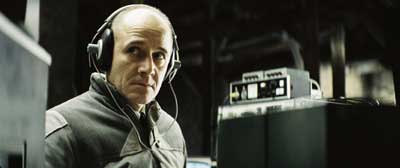
[3.] The Lives of Others: The one hold-over from 2006 on the list this year (I was pretty thorough about catching up before posting last January, although I still never did see Inland Empire), The Lives of Others is a timely and compelling parable of art, politics, surveillance, and moral awakening in the final days of the Stasi. In a way, Lives is an East German counterpart to Charlie Wilson’s War, a story about how even small political acts of individual conscience can change the world, even (or perhaps especially) in a decaying Orwellian state. With a memorable central performance by Ulrich Muhe and a languid conclusion that ends on exactly the right note, the resoundingly humanist Lives of Others is a Sonata for a Good Man in Bad Times. We could use more of its ilk.

4. Knocked Up: Judd Apatow’s sweet, good-natured take on modern love and unwanted pregnancy was probably the most purely satisfying film of the summer. As funny in its pop-culture jawing as it was well-observed in its understanding of relationship politics, Knocked Up also felt — unlike the well-meaning but overstylized Juno, the film it’ll most likely be paired with from now herein — refreshingly real. As I said in my recent review of Walk Hard, an eventual Apatow backlash seems almost inevitable given how many comedies he has on the 2008 slate. Nevertheless, we’ll always have Freaks & Geeks, and we’ll always have Knocked Up.

5. The Bourne Ultimatum: The third installment of the Bourne franchise was the best blockbuster of the year, and proved that director Paul Greengrass can churn out excellent, heart-pounding fare even when he’s basically repeating himself. Really, given how much of Ultimatum plays exactly like its two predecessors on the page — the car chase, the Company Men, the Eurotrash assassin, Julia Stiles, exotic locales and cellphone hijinx — it’s hard to fathom how good it turned out to be. But Bourne was riveting through and through…You just couldn’t take your eyes off it. I know I’ve said this several times now, but if Zack Snyder screws up Watchmen (and I’d say the odds are 50-50 at this point), the lost opportunity for a Greengrass version will rankle for years.

6. Zodiac: The best film of the spring. What at first looked to be another stylish David Fincher serial killer flick is instead a moody and haunting police procedural about the search for a seemingly unknowable truth, and the toll it exacts on the men — cops, journalists, citizens — who undertake it for years and even decades. Reveling in the daily investigatory minutiae that also comprise much of The Wire and Law and Order, and arguably boasting the best ensemble cast of the year, Zodiac is a troubling and open-ended inquiry that, until perhaps the final few moments, offers little in the way of satisfying closure for its characters or its audience. Whatever Dirty Harry may suggest to the contrary, the Zodiac remains elusive.

7. 28 Weeks Later: Sir, we appear to have lost control of the Green Zone…Shall I send in the air support? Zombie flicks have been a choice staple for political allegory since the early days of Romero, but one of the strengths of Juan Carlos Fresnadillo’s merciless 28 Weeks Later — perhaps the best horror sequel since James Cameron’s Aliens — is that it foregoes the 1:1 sermonizing about failed reconstructions and American hubris whenever it gets in the way of the nightmare scenario at hand. (Besides, if you wanted to see explicit muckraking about current events this year, there were options aplenty, from In the Valley of Elah to No End in Sight, although plenty of this year’s politically-minded forays — Rendition, Lions for Lambs — looked rather inert from a distance.) There’s little time for moralizing in the dark, wretched heart of 28 Weeks Later: In fact, the right thing to do is often suicide, or worse. You pretty much have only one viable option: run like hell.

8. In the Valley of Elah: Paul Haggis’ surprisingly unsentimentalized depiction of the hidden costs of war for the homefront, Elah benefits greatly from Tommy Lee Jones’ slow burn as a military father who’s lost his last son to a horrific murder. In fact, it’s hard not to think of Jones’ inspired performances here and in No Country of a piece. There was something quintessentially America-in-2007 about Jones this year. In every crease and furrow of this grizzled Texan’s visage, we can see the wounds and weariness of recent times, the mask of dignity and good humor beginning to slip in the face of tragic events and colossal stupidity. Jones is masterful in Elah, and while Daniel Day-Lewis seems to be garnering most of the accolades for There Will Be Blood and Philip Seymour Hoffman stunned in three pics this fall (all on the list below), I’d put Jones’ work here as the best of the year.

9. There Will Be Blood: Ah, the maddening There Will Be Blood. I just reviewed this one yesterday, so it’s doubtful my opinion on it has changed much. But what Anderson’s film reminds me of most at the moment (and not only for the Daniel Day-Lewis connection) is Scorsese’s Gangs of New York, a movie I reviewed at the end of 2002 and then bumped up a few spots a week later when writing the 2002 list, thinking that its flaws would diminish over time. They haven’t — if anything, they’re just as noticeable as ever. So it may well be with TWBB. Even despite its somewhat unseemly pretensions to greatness, the first hour or so of There Will Be Blood, from the Kubrickian opening to the Days in Heaven-ish burning oil rig, is as powerful and memorable as you could ever want in a film. But TWBB loses its way, and the second half is a significantly less interesting enterprise, ultimately culminating in that goofy, illogical bowling alley ending. I’d characterize Blood as a significant step forward for PTA, and there’s something to be said for getting even this close to a masterpiece. But he hasn’t struck black gold yet.

10. Hot Fuzz: While I personally still prefer Shaun of the Dead, this fish-out-of-water, buddy-cop action spectacle proved the droll British team of Nick Frost, Simon Pegg, and Edgar Wright can’t be considered one-hit-wonders (and that they’re as savvy about certain pop culture tropes as their American colleagues in the Apatow camp.) And, while I didn’t see Elizabeth II: The Golden Age, Hot Fuzz may well include the second-best Cate Blanchett performance of the year.
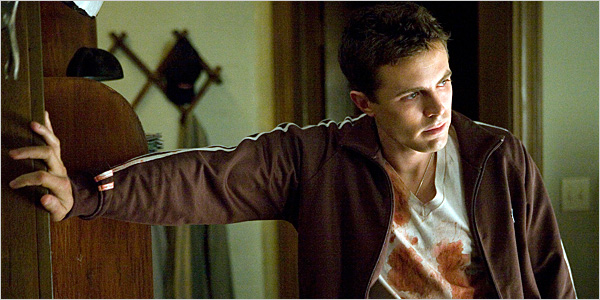
11. Gone Baby Gone: First-time director Ben Affleck acquits himself well with this chronicle of missing children and seedy n’er-do-wells in working-class Boston, wisely choosing to stick with a town and a leading man he knows like the back of his hand. His brother Casey holds his own, and crime author Dennis Lehane’s original source material provides some compelling twists-and-turns throughout. And, as the drug-addled, quick-to-dis Townie mom who’s lost her baby, The Wire‘s Amy Ryan gives arguably the Best Supporting Actress performance of the year (although she’ll likely get some run from Blanchett’s Jude Quinn.)

12. Michael Clayton: Clooney’s impeccable taste in projects continues with this, Tony Gilroy’s meditation on corporate malfeasance and lawyerly ethics (or lack thereof.) The bit with the horses still seems a convenient (and corny) happenstance on which to hang such a major plot point, and I found Tilda Swinton to be overly mannered and distracting for much of the film’s run. But most else about Michael Clayton, from Sidney Pollack’s Master of the Universe to Michael O’Keefe’s snide, unctuous #2 to Tom Wilkinson’s last scene to Clooney not rebounding as well to events as, say, Danny Ocean, rang true. A small film, in its way, but a worthwhile one.
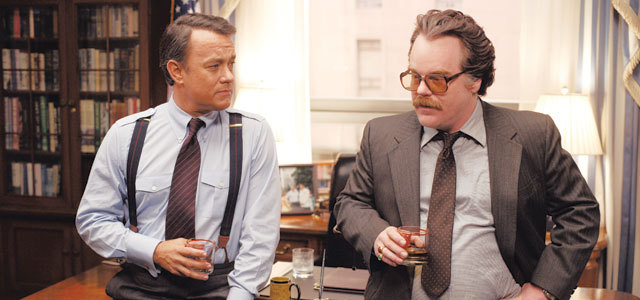
13. Charlie Wilson’s War: Another one I wrote on in the past 24 hours, so I don’t have much to add. Perhaps the best thing about Mike Nichols and Aaron Sorkin’s adaptation of Crile’s book is that it “gets” politics like few recent Washington thrillers I can think of. Philip Seymour Hoffman shows impeccable comic timing as the gruff Gust Avrakotos, and he works very well with Hanks here, who’s gone from being overexposed a few years ago back to a guy I wouldn’t mind seeing more of, particularly if he continues along the Alec Baldwinish character actor path Wilson sometimes suggests could be his future.
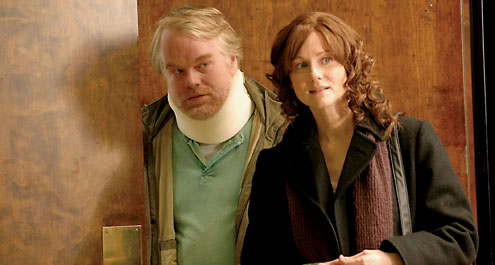
14. The Savages: I actually thought about putting Tamara Jenkins’ The Savages higher on this list, and few other movie endings this year hit me in the gut quite like this one. But, there are definite problems here, such as the wheezy Gbenga Akinnagbe subplot, which compel me to keep it here in the mid-teens. Still, this comedy about an ornery lion in winter, and the battling cubs who have to come to his aid, is a worthwhile one, and particularly if you’re in the mood for some rather black humor. As Lenny the senescent and slipping paterfamilias, Philip Bosco gives a standout performance, as does Hoffman as the miserable Bertholdt Brecht scholar trapped in deepest, darkest Buffalo.
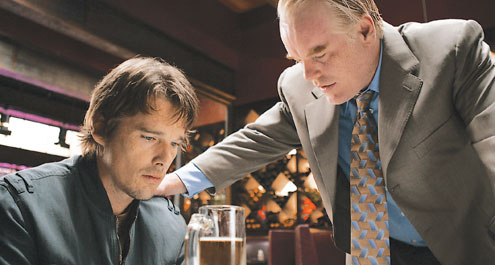
15. Before the Devil Knows You’re Dead: Now, Before the Devil is a movie I did end up seeing twice, on account of Brooklyn friends who were looking to catch it, and the film didn’t bring much new to the table on that second viewing. Still, Sidney Lumet and Kelly Masterson’s lean family tragedy benefits from several excellent performances — most notably by Hoffman, Ethan Hawke, Marisa Tomei, and Albert Finney, but also in supporting work by Amy Ryan, Michael Shannon, Brian O’Byrne, and Rosemary Harris — as well as a memorable Carter Burwell score. (Also, it’s just a coincidence that the three Hoffman movies ended up in a row like this — Still, it’s a testament to the man’s ability that he seemed unique and fully formed in each. Then again, the only time I can think of that Hoffman was actually bad in a film was Cold Mountain, which was pretty glitched up regardless.)

16. Sunshine: Along with There Will Be Blood, Danny Boyle and Alex Garland’s exasperating Sunshine is the other film this year that saw an amazing first hour become undone by breathtakingly poor choices on the back end. Unlike the halting, confused slide of TWBB, though, the moment where Sunshine slips the rails is clear-cut and irrefutable: It’s when what had been a heady science fiction tale about a near-impossible mission to the heart of the sun became instead an unwieldy space-slasher flick, i.e. basically an Armageddon variation on Jason X. The wreckage this subplot makes of what had been a superior hard-sci-fi film is more than a little depressing…Still, for that first hour, Sunshine is really something, perhaps the best realistically-portrayed outer space voyage we’ve seen on-screen in years.
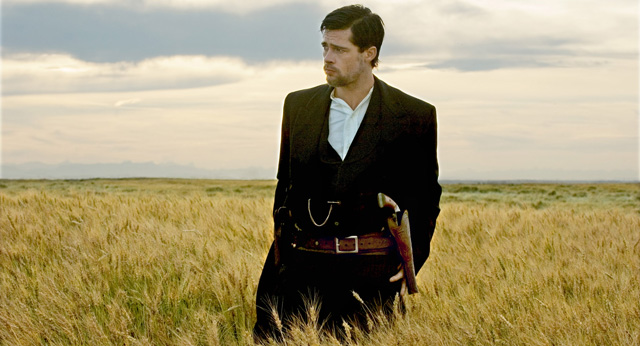
17. The Assassination of Jesse James by the Coward Robert Ford: Andrew Dominik’s sprawling psychological western about the end of the West and the early days of American celebrity-worship is every bit as ambitious and flawed as PTA’s There Will Be Blood. Still, maybe it’s the often stunning Roger Deakins cinematography, or the lively character actors (Sam Rockwell, Jeremy Renner, Garret Dillahunt) in the margins of the film, or maybe it’s even the terrible omniscient voiceover, which is every bit as distracting as the similarly ham-handed one in Little Children, and so goofy at times it verges on endearing. Whatever it is, I warmed to Jesse James more than I probably should, and for whatever reason I feel more willing to forgive it its considerable problems. If you blinked, you probably missed its theatrical run…but maybe it’ll find new life on DVD, when the 160-min running time won’t seem so off-putting.
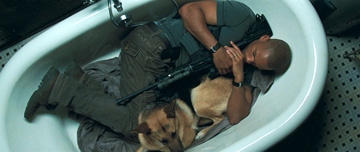
18. I am Legend: When the film focused on Will Smith and his dog fighting blood-sucking and badly rendered CGI Infecteds (whose level of social deevolution changed back and forth solely to accommodate turns in the plot), Francis Lawrence’s I am Legend could seem pedestrian and forgettable. But, when the movie focused on Will Smith and his dog fighting interminable loneliness in an eerily abandoned New York City, which was most of the first two-thirds of the film, I am Legend was a surprisingly melancholy and resonant blockbuster. What can I say? This one hit me where, and how, I live.
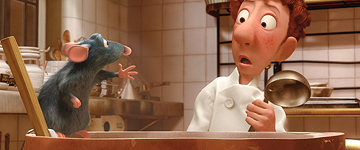
19. Ratatouille: There’s no review of this one up — I actually only saw it on DVD last week. And yet, while Ratatouille is a visual marvel (and Brad Bird and the PIXAR gurus don’t seem to make bad films), I found this nowhere near as inventive or entertaining as their last collaboration, 2004’s The Incredibles. (I’d put this one at about the level of Cars.) Now, this may in part be due to the fact that I have much more interest in comic book conceits than the culinary arts. (I’d even go so far as to say that I find many foodies — particularly those who blather on endlessly about Parisian cuisine — kind of insufferable.) Still, even given my relative lack of interest in the subject matter, Ratatouille bugged me. If “anyone can cook,” as Chef Gustave proclaims, why is no one’s input ever important but the rat? If it’s bad to make money selling pre-cooked (and affordable) food to the teeming masses, as Ian Holm’s character tries to do, why is it any better to do what Remy does? (And why should we care then when he and Gustave Jr. move into a deluxe apartment in the sky? I thought this enterprise wasn’t about making money.) In short, I thought Ratatouille wanted to have it both ways, cloaking a rather elitist, even snobbish story in the trappings of democratic tolerance. And the closing monologue by Peter O’Toole’s Anton Ego, which I thought ostensibly tried to make the movie critic-proof, irked me too. But, all that aside, it does look real purty.
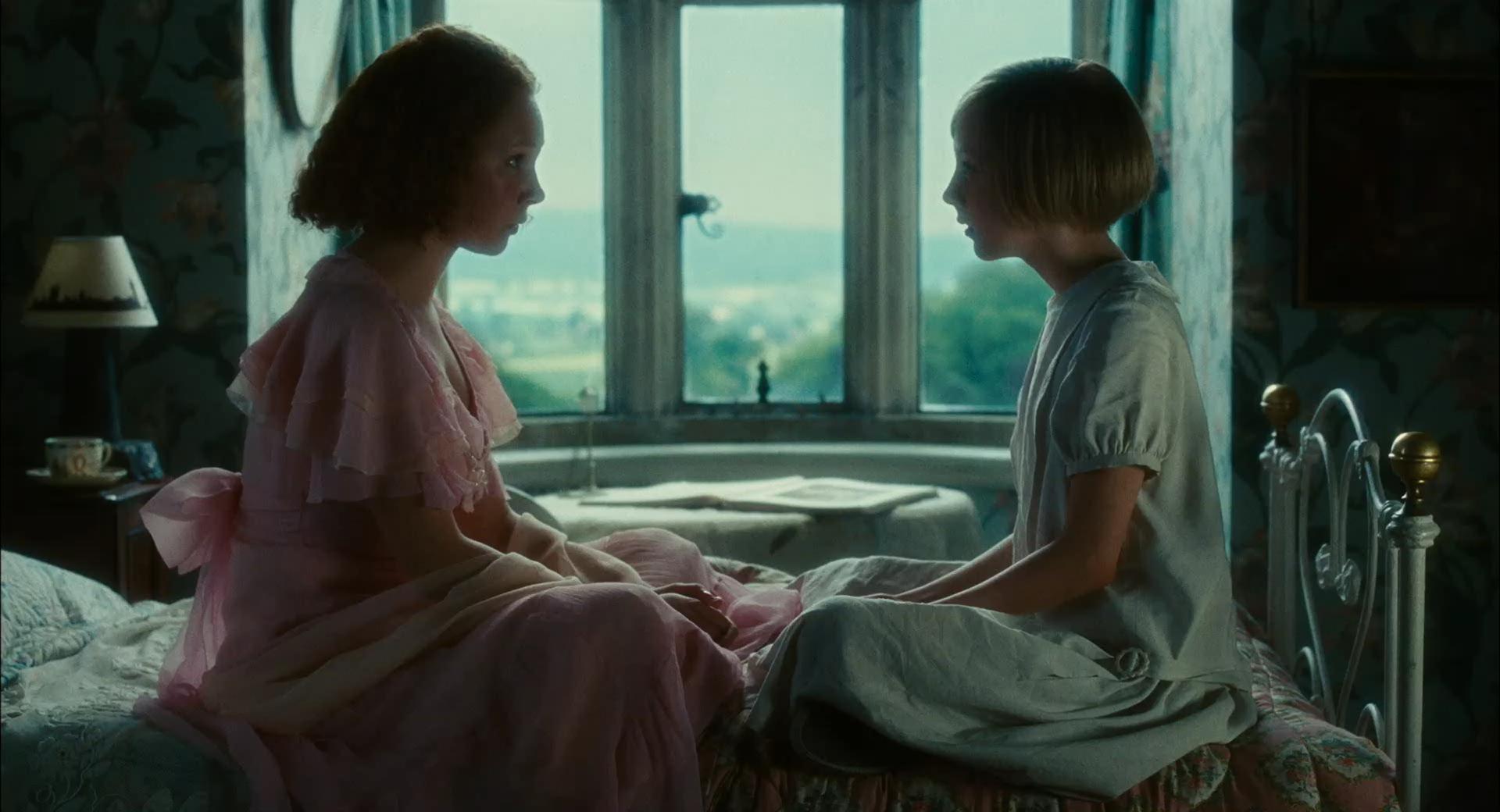
20. Atonement: There were several contenders for this last spot on this list, including Harry Potter and the Order of the Phoenix, The Simpsons Movie, and Jason Reitman’s Juno. But in the end I went with Joe Wright’s take on Ian McEwan’s novel, partly because people I trust who haven’t read the book beforehand haven’t shared my issues with the film. If nothing else, Atonement looks ravishing, and it features breakout performances by James McAvoy, Romola Garai, and Saiorse Ronan. Still, in a year that saw No Country and Diving Bell, I wish Wright had been less conventional in its approach to the story, and found a way to do the gloomy, misanthropic ending of McEwan’s novel justice.
Most Disappointing: The Golden Compass, Grindhouse, Spiderman 3, Southland Tales
Worth a Rental: 3:10 to Yuma, Beowulf, Eastern Promises, Harry Potter and the Order of the Phoenix, Juno, Live Free or Die Hard, Lust, Caution, Ocean’s 13, The Simpsons Movie, Stardust, Superbad, Walk Hard: The Dewey Cox Story
Don’t Bother: 300, Across the Universe, American Gangster, The Darjeeling Limited, Interview, The Invasion, Margot at the Wedding, The Mist, Pirates of the Caribbean 3: At World’s End, Transformers, You Kill Me
Best Actor: Tommy Lee Jones, In the Valley of Elah; Daniel Day-Lewis, There Will Be Blood
Best Actress: Ellen Page, Juno
Best Supporting Actor: Javier Bardem, No Country for Old Men
Best Supporting Actress: Amy Ryan, Gone Baby Gone; Cate Blanchett, I’m Not There
- A Good Year For:
- Casey Affleck (Assassination of Jesse James, Gone Baby Gone)
- Judd Apatow (Knocked Up, Superbad, Walk Hard)
- Josh Brolin (American Gangster, Grindhouse, In the Valley of Elah, No Country)
- Michael Cera (Superbad, Juno)
- Garret Dillahunt (No Country for Old Men, Assassination of Jesse James)
- Full-Frontal Parity (Diving Bell, Eastern Promises, I’m Not There, Walk Hard)
- Philip Seymour Hoffman (Before the Devil, Charlie Wilson’s War, The Savages)
- Tommy Lee Jones (In the Valley of Elah, No Country for Old Men)
- Man’s Best Friend (I am Legend, The Savages)
- Pregnant Hipsters (Knocked Up, Juno)
- Seth Rogen (Knocked Up, Superbad)
- Amy Ryan (Before the Devil, Gone Baby Gone)
- Texans (No Country for Old Men, Charlie Wilson’s War)
- The Western (3:10 to Yuma, Assassination of Jesse James, No Country for Old Men, There Will Be Blood)
- A Bad Year For:
- The Beatles (Across the Universe, Walk Hard)
- Josh Brolin’s PETA standing (American Gangster, No Country for Old Men)
- Great Cities (28 Weeks Later, I am Legend)
- Kidman/Craig Pairings (The Invasion, The Golden Compass)
- The Male Derriere (Charlie Wilson’s War, Margot at the Wedding)
- Standard-Issue Music Biopics(I’m Not There, Walk Hard)
2008: Be Kind, Rewind, Cassandra’s Dream, Cloverfield, The Curious Case of Benjamin Button, The Day the Earth Stood Still, Funny Games, Harold and Kumar Escape from Guantanamo, Harry Potter and the Half-Blood Prince, Hellboy 2: The Golden Army, In Bruges, The Incredible Hulk, Indiana Jones and the Kingdom of the Crystal Skull, Iron Man, James Bond 22, Jumper, Leatherheads, My Blueberry Nights, The Chronicles of Narnia: Prince Caspian, Revolutionary Road, Run, Fat Boy Run, Speed Racer, Star Trek, Valkyrie, Wall-E, Wanted, The X-Files 2…let’s see, am I missing anything…?

Welcome, 2008. I’ll see y’all on the other side.
Mr. Wilson Goes to Washington.
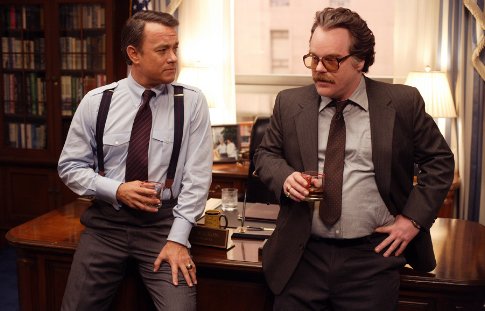
At one point in Mike Nichols’ smart, surprisingly enjoyable Charlie Wilson’s War, the freewheeling, fun-loving Representative Charles Wilson (Tom Hanks), he of the Texas 2nd Congressional District, tells his schlubby, foul-mouthed partner at the CIA, Gust Avrakotos (Philip Seymour Hoffman), “You ain’t James Bond.” Deadpans Avrakotos, “You ain’t Thomas Jefferson, so let’s call it even.” True, Bond and Jefferson they’re not, but that’s actually part of the appeal of Nichols’ lively little film. A strangely optimistic, almost Capraesque movie about the covert proxy war in Afghanistan (and, ultimately, the inadvertent role played by the U.S. in fostering the Taliban), Charlie Wilson’s War — adapted by The West Wing‘s Aaron Sorkin from the book by the late George Crile — is no grim, sober-minded edutainment. Moving at a brisk clip and maintaining a light touch — too light, some might argue — throughout, the movie instead depicts how a few (relatively) ordinary, committed people can change the world…provided one of them is sitting on the House Defense Subcommittee, and has stacked up a sizable amount of chits.
When — after a quick flash-forward setup — we first meet Congressman Charlie Wilson (Tom Hanks, eschewing the Pvt. Ryan earnestness for his more sardonic Bachelor Party/Volunteers side), he’s lounging in a Vegas hot tub with a coke-snorting television producer, a Playboy bunny, and two strippers. In short, he seems like a out-and-out cad. But there’s something endearing and even statesmanlike about his piqued interest in a 60 Minutes report, playing in the corner, on the mujahideen in Afghanistan. (Maybe it’s the Dan Rather Texas connection.) Delving further into the issue back in Washington, Wilson — exercising the power of his crucial committee position — singlehandedly doubles U.S. funding of the mujahideen from $5 million to $10 million. This by-all-accounts token gesture draws the attention of the wealthy Houston socialite Joanne Herring (Julia Roberts, solid), a woman with money, connections, and a fervent commitment to anticommunism, and she sends Wilson off to Pakistan to meet with President Zia-ul-Haq about the situation in neighboring Afghanistan. There, Wilson is moved to the cause by the sight of a dismal refugee camp, and soon enough, he’s enlisted an important ally in Avrakotos, a profane Langley veteran (Hoffman, showing yet another side after Before the Devil and The Savages this year, and nearly running away with the movie.) Together, these three — Wilson, Herring, Avrakotos (John Rambo’s unique contributions to the cause of Afghan freedom are sadly overlooked — set in motion a scheme not only to increase funding radically for the war but to funnel Soviet weaponry owned by Israel and Egypt to the freedom fighters there. Of course, some delicate diplomacy is required, and, in any case, giving Afghan youths an arsenal of helicopter-slaying RPGs doesn’t seem like such a great an idea in retrospect…
While nodding to the dismal events that follow American intervention in the region, Charlie Wilson’s War hardly dwells on the blowback, or on anything — a few refugee camp horror stories and a Pavel Lychnikoff cameo notwithstanding — that might interrupt its tone of hearty, back-slapping jocularity. (Supporting turns by Amy Adams, Emily Blunt, Ned Beatty, Denis O’Hare, John Slattery, and Peter Gerety help speed things along in a comfortable groove.) And yet, however feel-good, Wilson ultimately feels more ripped from the headlines than even the filmmakers could’ve guessed. Some lawmakers have trouble distinguishing between Pakistan and Afghanistan at one point, and Herring begins an introduction of Pakistan’s President by saying, “Zia did not kill Bhutto.” (Leavening the chill that follows this now-eerie moment, Rudy Giuliani and John Murtha also come up at various times as punchlines.)
But, its timeliness and prescience aside, what I found most impressive about Charlie Wilson’s War is how aptly it portrays the feel of Washington. This was somewhat surprising to me as, while I liked Sorkin’s The West Wing decently enough as a TV drama and admired its general idealism about politics, the show always felt rather fake to me. But, be it due to Crile or Sorkin or Nichols, Wilson conveys a lot of the telling details of life inside the Beltway quite well — the hallway horse-trading and neverending quid pro quos, the simultaneous meetings, the bland, institutional cafeterias; the bevy of youngish staffers (and inordinately pretty administrative assistants) on Capitol Hill, the deals crafted over dinner or drinks, the conference calls, the memory holes, myopic thinking, and CYA behavior. Outside of The Wire‘s nuanced take on the compromises of Baltimore city politics, it’s hard to think of a more on-target recent portrayal of the (non-campaigning) political process. Sadly, for Congressman Wilson as for today’s legislators, fiddling with the internal dynamics of far-flung nations we barely understand for short-term gain is All in the Game. Still, as Charlie Wilson’s War proves, don’t let it ever be said that nothing gets done in Washington.
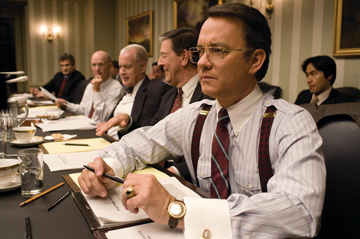
The Man with the Golden Gun (and One Red Shoe.)
Also (sorta) in the trailer bin, Tom Hanks. Is. Bond. (By way of my sister Tessa.)
Mona Lisa Frown.
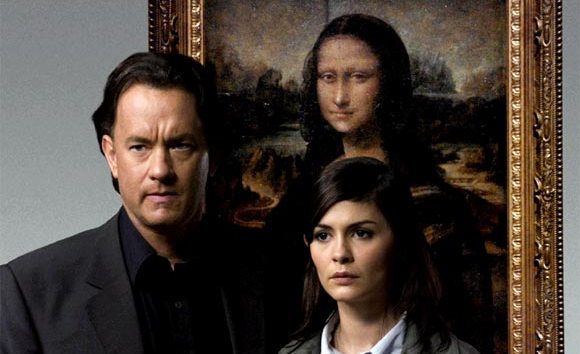
So, I was one of the minority of people out there who had not already read Dan Brown’s The Da Vinci Code when I ventured into the theater last week for a look-see at the film version (although various people had filled me in on most of the major plot points over the years.) This was partly because I had been told a few times that the novel read like a piece of cinema anyway, so I figured that, contrary to my usual m.o., I’d just wait for the movie. Well, unfortunately, Ron Howard’s film plays at best like a book-on-tape, one that might’ve made for a good airplane listen if the people involved hadn’t taken this enterprise so seriously. As it is, unless you relish usually likable actors spouting forth clunky, Akiva Goldman-penned chunks of exposition at you for two and half hours, leave this Code undeciphered.
Like I said, I’m really late to this party, so you probably don’t need me to summarize the basic gist here. In any case, world-renowned symbologist Robert Langdon (Tom Hanks), a Harvard professor prone to monologuing and/or gasping in awe when confronted with ancient relics (thank goodness, or otherwise he’d have nothing to do here) is thrust into a murder mystery after a colleague is found dead at the Louvre, his body bloodied by his own hand and laid out like Leonardo da Vinci’s Vitruvian Man. (As we saw in one of the movie’s creepier scenes (also in the trailer), this fellow was killed — under the watchful eyes of countless mournful Madonnas — by the albino monk Silas, an operative of Opus Dei with some serious body issues.) Soon, with the aid of the dead man’s painterly granddaughter, Sophie (Audrey Tautou), Langdon embarks on a quest to uncover the meaning behind the man’s murder, and, while puzzling and ciphering away, inadvertently stumbles onto a two-thousand-year-old conspiracy involving the divinity of Jesus and the Holy Grail, one that certain conspiring cardinals (Alfred Molina) and their pet monks will kill to keep under wraps…
That’s the upshot, and, as you can see, this has all the makings for a decent potboiler. And, at times, watching Hanks and Tautou puzzle away or seeing the film flashback to the Cecil B. DeMille days, one gets the sense that the Da Vinci Code is probably a thoroughly enjoyable beach book. But, as a film — or at least as this ponderous, too weighty-by-half film — it’s a total non-starter. Howard, Hanks, and Tautou can’t seem to stop treating this movie as an epic, when what it really needed was a slapdash of Raiders of the Lost Ark tongue-in-cheek. (In fact, I thought Nicolas Cage’s campy Da Vinci knock-off National Treasure came closer to the unapologetic B-movie tone needed here.) On the bright side, Ian McKellen (as a wry Grail historian, gleefully chewing his way through yet another bad summer movie), Molina (himself an Ark alumnus), and — briefly — Jurgen Prochnow (as a shifty Swiss banker) seem to have a better sense of the proceedings here, and they add some much-needed levity and narrative kick whenever they’re onscreen. Still, their best efforts aren’t enough to recommend Da Vinci, a film that needed less clumsy exposition and a jauntier sense of fun throughout. As it is, The Da Vinci Code is a rather staid canvas.
Code Red.
As Dan Brown’s copyright case closes in London, the full trailer for The Da Vinci Code premieres online (and as if the McKellen voiceover last time wasn’t a deliberate enough ploy to crib some epic gravitas from LotR, now we’ve got the Two Towers Requiem mix to boot.)
Mona Lisa Smile.
Ian McKellen’s voiceover lends some Gandalfian grandeur to the new trailer for Ron Howard’s version of Dan Brown’s The DaVinci Code, also starring Tom Hanks (with eighties hair), Audrey Tautou, Paul Bettany (in albino mode), Alfred Molina, and Jean Reno. I never read the book, but I suppose I’d pay ten bucks to see this.
Cavaliers and Clay.
In the trailer bin today, Movie-Voice-Guy does his Almighty best to oversell The Da Vinci Code, and Wallace and Gromit leap to the big screen in W&G: The Curse of the Were-Rabbit.
Boo Hiss.
Y’know, after RotK‘s commanding sweep last year, I’d almost forgotten about Chicago, A Beautiful Mind, The English Patient, and all the myriad ways Oscar tends to be generally lame. But today’s nominations brought it all roaring back.
No Eternal Sunshine for best picture? That’s the most egregious snub since Three Kings, Being John Malkovich and Fight Club were all overlooked in favor of the much-overhyped American Beauty (to say nothing of ghastly drek like The Cider House Rules and The Green Mile.) Neither Jim Carrey nor Paul Giamatti for Best Actor? Giamatti’s snub is particularly cruel, given that both Thomas Haden Church and Virginia Madsen were nominated. Clive Owen and Natalie Portman? I think highly of them both, but as I said of the Globes, Closer was a lousy, over-the-top flick that confused explicit talk for serious purpose, and has no business being up for anything. (The same might be said of Johnny Depp in Finding Neverland — Depp rarely gives a bad performance, but, from what I gather, Neverland is a rote, by-the-numbers biopic. I haven’t seen it, though.)
To be honest, these choices generate zero excitement on this end (even if there’s a very outside chance I win a Soctopus that evening.) But, for tradition’s sake…
Best Picture: It’ll come down to The Aviator or Sideways, and my bet is this is the year the Academy honors Scorsese (partly for making Old Hollywood look so glamorous.)
Best Director: Martin Scorsese, The Aviator. See above. It’s Scorsese’s year…and that’ll be the lead for the evening.
Best Actor: Leonardo di Caprio, The Aviator. I could see Don Cheadle winning here, but, when in doubt, pick the actor playing the crazy and/or mentally deficient guy. (Jack Nicholson/As Good as it Gets, Geoffrey Rush/Shine, Tom Hanks/Forrest Gump, Anthony Hopkins/Silence of the Lambs, Dustin Hoffman/Rain Man, etc. etc.) I need to see the blueprints…
Best Actress: Kate Winslet, Eternal Sunshine. Besides being an Oscar darling, she’s helped by the fact that the movie got screwed in all the other categories. (Kinda like how the Moulin Rouge enthusiasts put Jim Broadbent over-the-top for Iris.)
Best Supporting Actor: Alan Alda, The Aviator. (This could just as easily have Alec Baldwin in the same film.) You could make a strong case for Jamie Foxx in Collateral, but I’m guessing his vote splits between here and Ray. Plus, Alda best fits the elder statesman role that generally wins these (Michael Caine/The Cider House Rules, James Coburn/Affliction, Martin Landau/Ed Wood, Gene Hackman/Unforgiven, Jack Palance/City Slickers.)
Best Supporting Actress: Cate Blanchett, The Aviator. This category can surprise, and Virginia Madsen and Natalie Portman are her closest competitors. But I figure the gist will be that Madsen should be happy to be nominated and Portman was a good performance in a bad film. (That being said, Portman’s role as a stripper is exactly the type of thing that often wins in this category — see: Kim Basinger/L.A. Confidential, Mira Sorvino/Mighty Aphrodite.)
Best Original Screenplay: Eternal Sunshine. The fan-favorite movie that the Academy feels bad for not quite “getting” generally goes here (Pulp Fiction, The Usual Suspects, Lost in Translation), and Eternal Sunshine will be no exception.
Best Adapted Screenplay: Sideways. I could see Before Sunset winning here, possibly. Still, I’ll say Sideways as recompense for the Giamatti snub.
Best Animated Feature: The Incredibles. No contest.
Code to Perdition.
Forrest Gump battles Opus Dei as Tom Hanks takes the lead in The Da Vinci Code, coming soon to a theater near you from Ron Howard and Brian Glazer (Apollo 13, A Beautiful Mind.) I haven’t read the book, so I can’t really vouch for the casting…but I presume this movie would make ridiculous bank with or without Hanks anyway.
